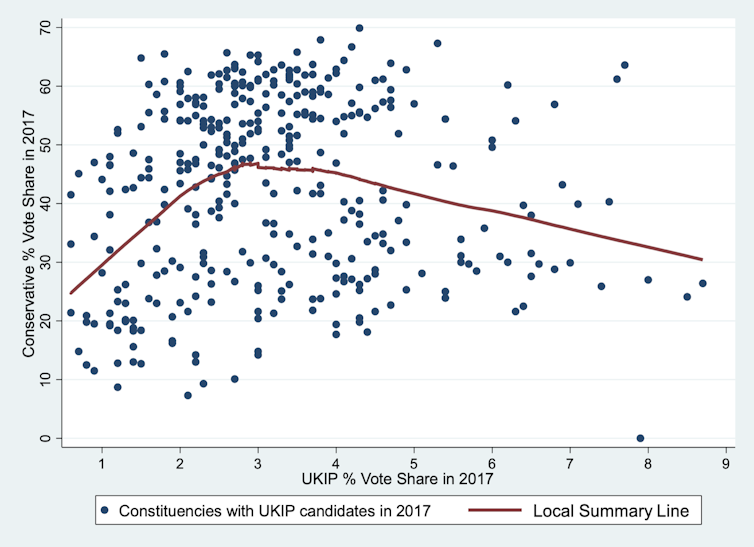Has Reform really overtaken the Tories in the polls? And does that mean it could beat them on July 4?

According to a recent YouGov survey, Reform UK has surpassed the Conservatives for the first time. The Tories have had a rough time during their election campaign, with a popularity rating of only 18%, whereas Reform has slightly overtaken them with 19%. Results from the same poll showed Labour at 37% and the Liberal Democrats at 14%.

Although this statement may attract attention, it essentially indicates that both the Conservatives and Reform parties are very close in the polls. This is due to the fact that surveys are prone to inaccuracies, which generally range from a margin of error of plus or minus 3% in a typical poll.
This occurs because even a survey that has been conducted well and is based on probability can yield results that contrast with a complete count of all voters. For example, if Reform records 21% in voting intentions and the Tories maintain their score of 18%, statistical theory indicates that Nigel Farage's party would have a 95% chance of leading the country.
Despite everything, it is evident that Farage's unexpected ascension as the fresh leader of Reform, and his choice to run for office in Clacton, has increased the backing for the party. Sunak's early withdrawal from the D-Day commemorations came as an aid to Farage as it enabled him to criticize the prime minister for not possessing enough patriotism.
Reform's recent success in a poll compared to the Conservatives prompts speculation about their ability to defeat them in the upcoming election. However, it is improbable that they will surpass the Conservative's number of seats in the House of Commons, but they may have a chance at winning a higher vote percentage.
It's crucial to keep in mind that Reform, formerly known as the Brexit party, has already emerged victorious over the Tories in a major British election. This occurred during the European Parliamentary elections in May of 2019, which have since faded from public memory. In fact, this triumph caused considerable disruption to the established political parties in the UK.
The Brexit party has achieved a victory by winning 29 seats in the European parliament. The Liberal Democrats trailed behind with 16 seats. Labour managed to secure 10 seats, and the Conservatives fell short with only four seats. This outcome reflects a significant decline in Conservative support as the Greens managed to grab three more seats than them.
During the midst of the chaos surrounding Brexit and Theresa May's unsuccessful attempts to secure an agreement with Brussels, my coworkers and I examined the election in our publication "Brexit Britain". Our assessment was that the overall attitude of the public was pessimistic, and many voters - regardless of their stance on Brexit - were inclined to punish the major political parties.
The European elections and general elections have distinct disparities. Typically, fewer people participate in the former, and the recent European elections were primarily centered around Brexit. In contrast, current surveys indicate that only 13% of the public consider Brexit to be the primary concern. Therefore, Brexit's relevance has subsided notably.
Nevertheless, we can all perceive that the prevailing attitude among the public is once again very negative, and that the desire to "punish the major political parties" is strongly felt.

Looking for additional coverage of the election from the academic professionals at The Conversation? In the upcoming weeks, we will provide you with knowledgeable evaluations of campaign events and will verify the accuracy of statements being presented.
Register for our latest election bulletin that comes your way every Friday throughout the campaign and further.
Our research into the European elections revealed that the Brexit party gained significant traction from certain demographics. This included older voters, people with less formal education, individuals with lower incomes, men, and those from working-class backgrounds. These groups were particularly supportive of the UK leaving the EU, and had a positive view of Nigel Farage while holding less favourable opinions of political figures like Jeremy Corbyn and Theresa May. Despite being a relatively new addition to the political scene (having been established in 2018), many individuals from these demographics felt a sense of connection to the Brexit party.
People who supported Brexit were also against the usual ways of doing things. They didn't like that some people had too much money while others didn't have enough, and they didn't like big companies either.
According to a recent YouGov survey about the 2024 election, voters who support the Reform party have comparable traits to those who supported the Brexit party in 2019. In the poll, none of the 18 to 24-year-olds supported the Reform party, while only older people showed interest. Additionally, support for the Reform party was notably greater amongst the working-class than the middle-class.
When it comes to backing Reform in the 2024 election, the key consideration is its impact on the Conservative vote. Regrettably, we cannot rely on data from the 2019 election as it is irrelevant in this context. This is because Farage asked Reform candidates to withdraw from Conservative constituencies to avoid splitting the pro-Brexit vote and give incumbent MPs a better chance. As a result, only 275 Reform candidates were active in the entire country, making it impossible to use the 2019 outcome as a reference point for what may transpire this time around.
Explore further: The 2024 Election - Number of Westminster Seats Each Party is Defending & Their Objectives on July 4th.
We have the option to examine how Ukip did in the 2017 general election. While Ukip remains present as a political party, their leaders, nominees, and followers prevalently shifted their allegiance to the Brexit party. Later on, they opted for Reform. This occurred at such a substantial rate that it can be stated that Ukip is similar to an older version of Reform.
Last year, Ukip presented 378 candidates, which is almost 60% of the available seats in Parliament. The graph illustrates the connection between the number of votes for the Conservative party and Ukip in these same constituencies.
The percentage of votes received by the Conservative and Ukip parties in the UK's 2017 election are being discussed.
The chart is made up of various dots which represent electoral districts. The summary line denotes how the proportion of votes for the two major parties in equivalent districts relates to each other. It's important to note that this is different from creating a summary line for all electoral districts. Instead, it reflects the changes in the relationship as Ukip gained more support nationwide.
This uncovers something quite fascinating - specifically, that the amount of votes for the Conservative and Ukip parties increased simultaneously as long as Ukip received less than 4% of the support. Essentially, the Conservative and Ukip parties were working together in these regions, as they both gained votes from the other political parties.
The situation took a sharp turn when Ukip surpassed the 4% threshold. At that point, the Conservatives and Ukip became competitors, with Ukip making advances at the expense of the Conservatives.
The reason behind this can be attributed to the support for leaving the European Union in the 2016 referendum. The correlation between Conservative voting in 2017 and the support for Leave was found to be only moderately significant (0.30), while the correlation with UKIP voting was much stronger (0.69). As a result, it can be inferred that in areas where a strong aversion to the EU existed, UKIP and its leader, Farage, were viewed as more reliable and trustworthy than the Conservative Party and Prime Minister May to carry out their wishes.
If Reform supporters act similarly to Ukip supporters in the 2017 election, the party will experience a significant increase in followers and become a formidable opponent to the Conservatives in almost every electoral district it competes in.
Although Brexit is not as important as it used to be and many voters now regret the decision, a survey by YouGov carried out last year revealed that about 33% of voters still want Brexit to happen. With many people losing faith in the current government, it is possible that Conservative voters who support Brexit will switch their allegiance to the Reform party.
Interestingly, this can lead to triumphs for both the Labour and Liberal Democrat parties in several of the constituencies being challenged.









































